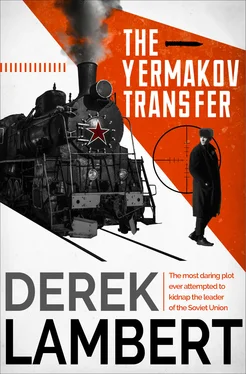He caught the glance of the blonde English girl and they exchanged the special smiles of travellers sharing experience. He passed his pack of cigarettes to her but she refused. He bracketed her as twenty-two years old, University graduate, the defender of several topical causes, apartment in Chelsea (shared).
But what was she scared of?
Unsolicited, the professional instincts of Harry Bridges began to surface. “Are you breaking your journey?” he asked.
“Three times,” she said. She didn’t elaborate.
“Novosibirsk, Irkutsk and Khabarovsk, I suppose. They usually offer you those. In fact they’re the only places they’ll let you off.”
The Intourist girl made disapproving sounds.
Bridges said: “Anyway, you’re travelling in distinguished company.”
“I know. I didn’t know anything about Yermakov being on the train.”
“So we’ll be together for at least a week.”
She looked startled. “Why, are you breaking your journey as well?”
“Wherever he stops” – Bridges pointed in the direction of the special coach – “I stop.”
“I see.” She frowned. She should have asked why, Bridges thought. Total lack of curiosity appalled him.
The train-spotter from Manchester joined in. “It’s going to be difficult to know when to go to bed and when to get up. They keep Moscow time throughout the journey.”
It was too much for the Intourist guide. “We sleep when we’re tired. We get up when we wake. We eat when we’re hungry.” She reminded Bridges of an air stewardess sulking because her affair with the pilot had run into turbulence.
“And we drink when we’re thirsty?” Bridges added. He grinned at the girl. “Would you like a drink?”
“No thank you.” She reacted as if he’d asked her to take her clothes off; it was out of character.
“Well I’m going to have one.” He slid off the bunk into the no-man’s-land between the berths. No one spoke.
He closed the door behind him and stood in the corridor hazed with smoke from the samovar. Frowning, he realised that he had set himself an assignment: to find out what the girl was scared of.
* * *
The serpent face of the pea-green electric locomotive of train No. 2 with its yellow flashes, red star and weather-proofed picture of Lenin nosed inquisitively through the fringes of Moscow. The driver, Boris Demurin, making his last journey, wished he was at the controls of an old locomotive for the occasion: a black giant with a red-hot furnace and a smoke-stack breathing smoke and cinders: not this sleek, electric snake.
For forty-three years Demurin had driven almost every type of engine on the Trans-Siberian. The old 2-4-4-0 Mallets built at Kolumna; S.O. classes from Ulan-Ude and Kransnayorsk; towering P-36 steam locos, E classes now used for freight-switching; American lease-and-lend 2-8-0’s built by Baldwin and ALCO for the United States Army which became the Soviet Sh(III); and then the eight-axle N-8 electrics renumbered VL-8’s.
Time had now begun to lose its dimensions for Demurin. He was prematurely old with coal dust buried in the scars on his face and he lived in a capsule of experience in which he could reach out and touch the historic past as easily as the present.
The capsule embraced the slave labour that had helped to build the railway; the corrupt economies which had sent trains charging off frost-buckled track; the life and times of Tsar Nicholas II who had baptised the railway only to die by the bullet beside it; the Czech Legion which had converted the coaches into armoured cars after the Revolution; Lake Baikal which had contemptuously sucked an engine through its ice when the Russians tried to cross it to fight the Japanese.
The railway’s heroes, its lovers and victims, peopled Demurin’s capsule. At seventeen he had stood on the footplate of a butter train bound for Vladivostock carrying 150 exiles to the gold and silver mines, with soot and coals streaming past his face: now, nearly half a century later, he was an attendant in a power house.
He scowled at his crew, bewildered by the fusion of time. “How are we doing for time?”
His second-in-command, a thirty-year-old Ukranian with a neat, knowing face and a glossy hair style copied from a 1940 American movie still, said: “Don’t worry, old-timer, we’re on time.”
The Ukranian thought he should have been in charge. Demurin’s rudimentary knowledge of electric power was notorious, and on this trip he was merely a symbol of heroic achievement. “Be kind to him,” they had said. “Get him there on time on his last journey.” If you fail, with Yermakov on board, they had implied, prepare yourself for a career shunting fish on Sakhalin island. The Ukranian, whose ambition was to drive the prestige train between Moscow and Leningrad, intended to keep the Trans-Siberian on time.
Demurin wiped his hands with a cloth, a habit – no longer a necessity. “Steam was more reliable,” he began. “I wonder …”
The Ukranian groaned theatrically. “What, old-timer, the line from St. Petersburg to the Tsar’s summer palace at Tsarskoye Selo?” But, although he was half-smart, he wasn’t unkind. He patted Demurin’s shoulder, laughing to show that it was a joke. “What do you remember, Boris?”
“In 1936 I was on the footplate of an FD 2-10-2 which hauled a train of 568 axles weighing 11,310 tons, for 160 miles.”
The item had surfaced like a nugget on sinking soil. He didn’t know why he had repeated it. It bewildered him all the more.
The Ukranian thought: That’s what Siberia does for you.
“Did you know,” Demurin rambled on, “that when Stalin and his comrades travelled on the Blue Express from Moscow to the Black Sea resorts they had the train sprayed with eau-de-cologne?”
The Ukranian didn’t reply. You could never tell what nuance could be inferred from any comment about a Soviet leader, dead, denounced or reinstated. All the carriages were crawling with police: it was quite possible that the locomotive, as well as the coaches, was bugged. He stared uneasily at the darting fingers of the dials.
Demurin was silent for a few moments. Silver birches flickered past the windows. Time had overtaken him, the trains had overtaken him. Timber, coal, diesel, electric. What next? Nuclear power? He smelled the soot and steam of his youth, stared round a curve of track with snow plastering his face. He stayed there for a moment, a year, a lifetime, before returning to the electrified present.
“Mikhail,” he said, “make sure we have a smooth journey. Make sure we keep to time. You understand, don’t you?”
The Ukranian said: “I understand.” And momentarily the smartness which masked knowledge of his own inadequacies was nowhere visible on his neat, ambitious face.
* * *
It was 10.10. The train was gathering speed and it would average around 37 m.p.h. It would traverse 5,778 miles to Vladivostock, pass through eight time zones and, without interruptions, finish the journey in 7 days, 1 6 ½ hours. It would normally make 83 stops, spending 13 hours standing at stations. It would cross a land twice the size of Europe where temperatures touched –70°C and trees exploded with the cold. It would circumvent Baikal, the deepest lake in the world, inhabited by fresh-water seals and transparent fish that melt on contact with air. It would skirt the Sino-Soviet border where Chinese troops had shown their asses to the Soviets across the River Amur, where the threat of a holocaust still hovered, until it reached the forests near Khabarovsk where the Chinese once sought Gin-Seng, a root said to rejuvenate, where sabre-toothed tigers still roam. At Khabarovsk, which claims 270 cloudless days a year – no more, no less – it would disgorge its foreigners who would change trains for Nakhodka and take the boat to Japan. The train had 18 cars and 36 doors; the restaurant car boasted a 15-page menu in five languages and at least a few of the dishes were available.
Читать дальше












